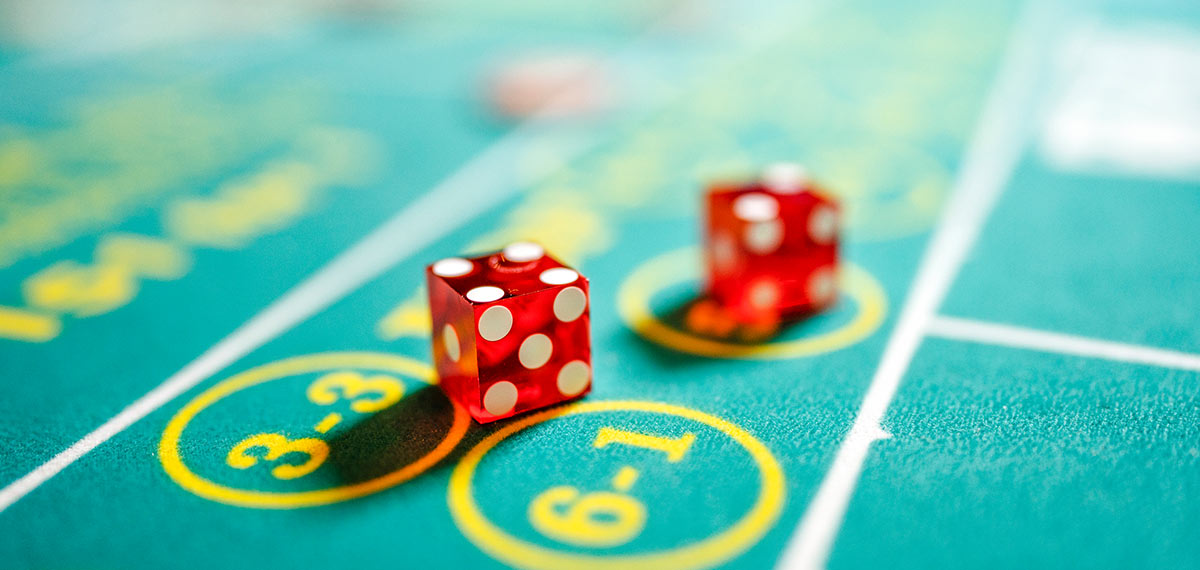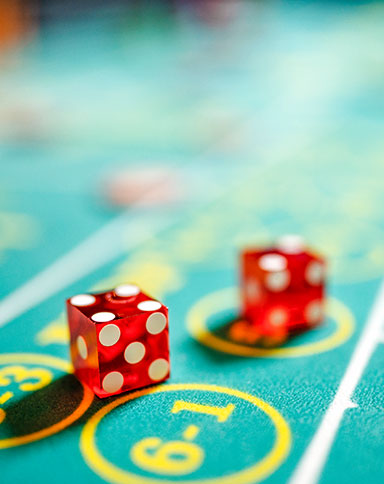

Craps Gaming Guide
One of the oldest games in America
Craps is fast moving, easy to play, and exciting - which is probably why it remains so popular to this day.
Shooter
Player who is rolling the dice. The shooter must place a “line” bet (“pass” or “don’t pass”) in order to be eligible to roll the dice. Of course, the shooter can place other bets in addition to the required “line” bet. Note that shooters who make “don’t pass” bets are not betting against themselves, they are simply betting that the dice will not “pass”.
Pass Line
This is an even-money bet (1 to 1). You’re betting with the shooter (either yourself or whoever has the dice). On the come-out roll (the first roll of dice with respect to a pass bet and don’t pass bet) you win if the toss is a natural (7 or 11) and you lose if it’s craps (2, 3 or 12). Any other number is a come-out point and in order to win, the shooter has to throw that number again before a 7 is thrown. If a 7 is thrown before the point, you lose. (The shooter must pass the dice). If you’ve bet on the pass, you can’t reduce your bet after a point has been established with respect to such bet.
Don't Pass Line
The opposite of pass line. (This time you’re betting against the shooter). You lose on come-out roll 7 or 11; win on a come-out roll 2 or 3. (1 to 1). A come out roll 12 is a standoff; neither a win nor a loss. If the point is established and made, you lose; if a 7 comes up before the point, you win (1 to 1). If you’ve bet the don’t pass, you may either remove or reduce your bet at any time you like. But you can’t increase or replace your bet until the next come out roll.
Come Bets
You can place a come bet at any time after the come-out roll. It’s like starting over, creating a whole new game within a game. If the next roll after you place your bet is a natural (7 or 11), you win (1 to 1); you lose if it’s craps (2, 3, or 12). If it’s any other number, the number will then become your personal come-point; you’ll win 1 to 1 if that number comes before a 7. If a seven is thrown before the come point, you lose. A come bet cannot be removed or reduced after a point has been established in relation to your bet. (You can make as many come bets as you like).
Don't Come Bets
Reverse of come bet. You lose if a natural (7 or 11) is the next roll after you place your bet. You win (1 to 1) if the roll is a craps 2 or 3. Twelve is a standoff. Any other number is your don’t come point, which pays even-money (1 to 1). If on the roll immediately following the placement of your don’t come bet a don’t come point is established and a 7 subsequently appears before that don’t come point is made, you win. Should the don’t come point show before a 7 is rolled, you lose. A don’t come bet may be removed or reduced at any time, but may not be increased or replaced.
Place Bets
May be made any time but they neither win nor lose on the come-out roll. You can bet on any individual number (4, 5, 6, 8, 9 and 10). If your number is rolled before a 7, you win. Should a 7 be rolled after making a place bet, you lose. The odds here vary: 4 or 10 pays 9 to 5; 5 or 9 pays 7 to 5; 6 or 8 pays 7 to 6. You can either remove or reduce your bet at any time after the dice have been rolled.
Buy Bets
A different version of place bets. Here you can bet on 4, 5, 6, 8, 9 or 10 setting your bet on the layout and telling the dealer the number you want. He will place the bet in the correct point box, a “buy” button is place on the bet to indicate you will be paid true odds. A 5% commission must accompany this bet. For example, if you bet the number 10 for $20 to win $40, your commission is 5% of $20 or $1. If your selected number appears before a 7, you win.
Lay Bets
Are the opposite of buy bets because they win on a 7 and lose when the point appears. By setting your bet on the layout and telling the dealer the number you want, he will place the bet in the correct box and put a “lay” button on the bet to indicate you will be paid true odds. A 5% commission wager for the lay bets is paid on the amount of payoff; whereas, the 5% commission wager for the buy bet is paid on the amount wagered.
Field Bets
A one-roll bet (you’re betting on only the upcoming roll) and you’re betting that one of seven numbers comes up. You get even-money (1 to 1) on a 3, 4, 9, 10 or 11 and 2 to 1 on a 2 / 3 to 1 on a 12; but, if a 5, 6, 7 or 8 come up, you lose.
Any Craps
A one-roll bet paying 7 to 1 if any craps (2, 3 or 12) is rolled. If any number other than 2, 3 and 12 is rolled, the bet loses.
3 Craps
A one-roll bet paying 15 to 1, but only on 3; loses on any other number rolled.
2 Craps
Another one-roll bet paying 30 to 1, but only on 2; loses on any other number rolled.
12 Craps
Also a one-roll bet paying 30 to 1, but only on 12; loses if any other number is rolled.
Seven
Your bet is good for one roll: pays 4 to 1 odds if 7 is rolled. If any other number comes up, the bet loses.
Eleven
You win with 11 only; a one-roll bet paying 15 to 1. Your bet is last on any other number.
Horn Bet
A one-roll combination of craps (2, 3, or 12 and 11). Should 2, 3, 12 or 11 show, you win. Bets are placed and payoffs are made as if each number (2, 3, 12 or 11) were four separate bets. Payoffs are made according to each individual total minus the three chips which were wagered on the other three numbers which lost. This bet is lost should any number other than the 2, 3, 12 or 11 be rolled.
Horn High Bet
A one-roll wager placed in units of five with four units wagered as a horn bet and an additional unit wagered on either 2, 3, 12 or 11. This bet is lost should any number other than 2, 3, 12 or 11 be rolled.
Hardways
Applies to even numbers only (4, 6, 8, 10). To win a hardway bet, 4, 6, 8 or 10 must be rolled in pairs; for instance, a hardway to 8 is two 4’s. You lose if your number is made any other way. You lose if a 7 is rolled. If you win, you collected odds of 9 to 1 on the 6 and 8; 7 to 1 on the 4 and 10. You can bet the hardway any time.
Odds
Odds offered on all Craps games will be at the sole discretion of Cannery Casino. Cannery Casinos offer supplemental wagers called “odds” on pass line, don’t pass, come and don’t come bets. When you make a pass line or don’t pass bet, you may make an additional wager any time after the come-out roll to supplement your original bet. When you make a come bet or don’t come bet, you may make an additional wager to supplement your original bet, after the roll following the placement of your original come or don’t come bet.
Supplemental wagers on pass line and come bets are referred to as “taking odds.” Supplemental wagers on don’t pass and don’t come bets are referred to as ‘laying odds”. Your “Laying odds” wager…5 and 9; 5 to 6 on 6 and 8. Your taking odds wager is paid at true odds – 2 to 1 on 4 and 10; 3 to 2 on 5 and 9 and 6 to 5 on 6 and 8. All come odds, hardways, place bets to win and buy bets are automatically “off” on any come-out roll unless called “ on” by you and confirmed by the dealer.
Fire Bet
A “Fire Bet” is a side wager that can be made in conjunction with the operation of a standard casino Craps game. “All casino policies, procedures and house rules will remain the same.
General Information
The player can only make a wager on this side bet, before the first “come Out” roll of a new shooter.
Fire Bet Limits: Only $1.00 - $5.00 wagers will be accepted.
A Fire Bet cannot be taken down or “called off,” once the shooter has established his/her initial point.
This side bet shall be paid according to the number of “INDIVIDUAL POINTS” the shooter successfully makes before “Sevening-Out”. *Note: The term “INDIVIDUAL POINTS” shall mean, when a point is successfully made from the pool of possible points (4, 5, 6, 8, 9, or 10) more than once, it shall neither advance nor subtract from the player’s goal of reaching a Fire Bet payoff threshold. THUS, MAKING A POINT MORE THAN ONCE WILL ONLY COUNT AS ONE “INDIVIDUAL POINT” MADE.
Points DO NOT HAVE TO BE IN ANY SPECIFIC ORDER.
Winning or losing on the “Come Out” roll will not effect this side bet. Only “Sevening Out” or successfully making all (6) Individual Points, will terminate the bet.
Markers shall be used to keep track of each “individual Point” that the shooter has successfully made.
As this is a “multi level” payoff structure, ONLY THE HIGHEST PAYOFF LEVEL MET, WILL BE PAID. Example: If (5) “Individual Point” are successfully made, ONLY the (5) point payoff will be made and not the lesser payoff threshold met. *With a $1.00 Fire Bet wager, the player would be paid $250.00 “and down” and not $275.00.
Odds
4 “INDIVIDUAL POINTS”……………..25 FOR 1
5 “INDIVIDUAL POINTS”……………250 FOR 1
6 “INDIVIDUAL POINTS”……………1000 FOR 1
 Log In
Log In